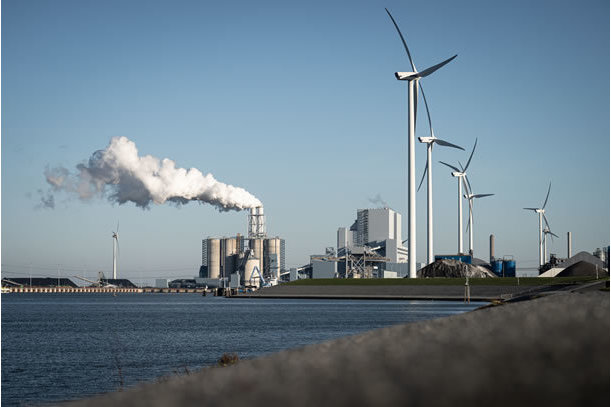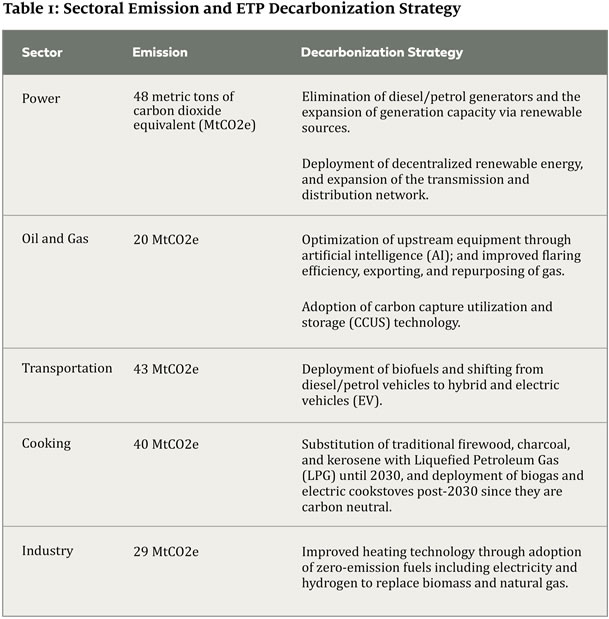The prospects of achieving the Nigerian energy transition plan

Feature Highlight
On 24 August 2022, the Federal Government of Nigeria introduced its Energy Transition Plan, a comprehensive strategy to mobilise investments, improve private sector involvement, and create opportunities in the energy transition.
Introduction
The 27th session of the Conference of the Parties (COP27) of the United Nations Framework Convention on Climate Change (UNFCCC) brought together world leaders to discuss issues related to climate change, with a focus on food security, water security, climate finance, energy security, vulnerable communities, and the need for a "just transition" away from fossil fuels. One important item on the agenda was the creation of a global fund to provide financial assistance to poorer nations impacted by climate disasters.
Energy transition involves transitioning from fossil fuels like oil and natural gas to cleaner and renewable energy sources such as wind, solar, biofuels, and hydroelectricity. This shift is motivated by a variety of factors, including the need for energy security, economic development, and the desire to reduce the negative environmental impacts of fossil fuels, which contribute to climate change through the release of greenhouse gases.
While energy transition presents a challenge for Nigeria in terms of potential declines in foreign exchange revenue from the oil trade, it is also driven by the need to ensure energy security as the country currently relies heavily on fossil fuels for energy. Adding renewable generation capacity can help to soften the impact of a full transition on Nigeria's energy supply and economy.
This article discusses the global view on fossil fuels as discussed at COP27 and examines Nigeria's position in relation to implementing the Nigerian Energy Transition Plan (ETP). The ETP aims to achieve universal energy access and net-zero emissions by 2030 and 2060, respectively, in line with Sustainable Development Goal 7.
Quest for Energy Security Post COP27
Energy security is the concept of having a continuous and reliable supply of energy, which is essential for economic stability and growth. At the COP27 climate change negotiations, countries agreed to reduce greenhouse gas emissions and shift towards clean, renewable energy sources to limit global warming to 1.5 degrees Celsius above pre-industrial levels. Many countries have already committed to transitioning to renewable energy to reduce their emissions and meet their energy needs. For instance, hydropower makes up 60% of Canada's electricity generation, while wind power accounts for 50% of Denmark's electricity generation, International Institute for Sustainable Development (IISD).
At COP27, the importance of providing financial, technological, and capacity-building support to developing countries was highlighted. A loss and damage fund was also established to help developing countries vulnerable to the negative impacts of climate change respond to, and recover from, loss and damage. Developed countries were urged to provide $100 billion in annual support to developing countries to aid their adaptation to climate change impacts.
Efforts to support developing countries by reducing the impacts of climate change and increasing their energy generation capacity through funding have led to significant growth in the renewable energy sector and lower costs of developing renewable energy plants, and improving energy security prospects in developing countries like Nigeria.
Nigeria has renewable energy potential from sources such as solar, wind, and hydroelectric power. Potential exists for expansion of solar generation capacity in Nigeria with its 11 hours of daily sunlight and low installed solar capacity of 33MW, according to IRENA Renewable Energy Capacity Statistics 2022. Roof-mounted solar panels, solar mini-grids, and large solar farms could be exploited to grow Nigeria’s solar capacity.
Wind power is a promising energy source in Nigeria, with several projects underway, including the 5KW/h Wind Power Project in Sayya Gidan-Gada, Sokoto, the 0.75KW/h project in Danjawa Village, Sokoto, the 1KW/h Hybrid Wind-Solar project in NCCE, Benin, and the 10MW Katsina Wind Farm. Hydroelectric power is another viable energy source in Nigeria with an installed generation capacity of 2,111MW. The potential for small hydropower plants in Nigeria is largely untapped, with over 278 small rivers suitable for developing small hydropower plants with a combined estimated capacity of 734MW. Nigeria's abundant renewable energy resources present a significant investment opportunity as the need for energy security remains a top priority for the country's post-transition economic growth.
Why Transition?
Transitioning to renewable energy has economic benefits. Nigeria's reliance on fossil fuels exposes its economy to global oil price fluctuations. In contrast, renewable energy sources such as solar and wind power are becoming increasingly cost-competitive and switching to these sources can diversify the country's energy mix and reduce the pressure to fund energy generation through fossil fuels.
Furthermore, the effects of climate change are an existential threat to humanity all over the world and developing nations in Africa are still at risk of being the most affected. In September 2022, devastating floods and rainfall displaced 1.5 million Nigerians with 612 deaths recorded. In all of West Africa, over 800 deaths were recorded. According to the World Weather Attribution group, “The rainy season in West Africa was 20% wetter than it would have been without the influence of climate change”.
Framework for Nigeria’s Energy Transition
The Federal Government of Nigeria (FGN) has implemented various policies and initiatives to address energy transition and climate change. These include the National Renewable Energy and Energy Efficiency Policy (NREEEP), which aims to increase the use of renewable energy in Nigeria, and the Solar Power Naija initiative, which aims to provide solar energy to 5 million households and benefit 25 million people. Additionally, the Renewable Energy Master Plan (REMP) aims to increase the proportion of renewable electricity in Nigeria from 13% in 2015 to 36% in 2030.
In recent times, there have been decarbonization policies such as the National Climate Change Policy for 2021–2030 aims to reduce carbon emissions and promote sustainable economic development while promoting a healthy and sustainable environment. Also, the Climate Change Act 2021 requires all government ministries and agencies and private enterprises in Nigeria to implement strategies for reducing carbon emissions, improving environmental sustainability, and increasing resilience to climate change.
On 24 August 2022, the FGN introduced Nigeria’s Energy Transition Plan (ETP), a comprehensive strategy to mobilize investments, improve private sector involvement, and create opportunities in the energy transition aimed at achieving net-zero emissions across five sectors highlighted in the table below by 2060.

The ETP identifies natural gas as the leading resource for the energy transition. It is expected that gas will eventually surpass crude oil as the main source of income and contribute to a reliable power supply and a cleaner environment. The ETP also asserts the eventual dominance of renewable energy sources like solar, biomass, hydro, and wind in Nigeria’s energy mix.
Key Considerations for Implementing Nigeria’s ETP
Following the launch of the ETP, more needs to be done to advance to an actual energy transition. Previous policies and frameworks have recorded little success due to a lack of implementation and awareness. The factors identified below should be considered to ensure the robustness of the ETP framework for a strong transition phase.
a) Policy, Regulations, and Governance
To effectively implement the ETP, there is a need to build a clear and robust regulatory framework that not only covers the present state of the Nigerian energy landscape but is also able to capture emerging technology and socio-political developments. For instance, in transportation, policies should consider emerging areas such as electric vehicles (EV) and charging stations.
b) Planning
Adopting integrated resource planning that considers all energy sources from generation to distribution and consumption is important, especially in the power sector. Timely deployment of key infrastructure in strategic locations will reduce transmission losses and improve overall system efficiency.
c) Technology and Innovation
System designs and technology that fit the local context (noting areas that have a high potential for solar, wind, or hydro) must be adopted in preparing the national grid for the integration of renewable generation capacity. Innovations needed for Nigeria’s energy transition require increased, intensive, and coordinated action by the FGN, private sector, and financial institutions including development finance institutions.
d) Financing Strategy
The Nigerian energy transition comes at a cost estimated at $1.9 trillion, according to the government’s estimate. Obtaining the necessary financing for the ETP will be a major but not insurmountable challenge. Investments in green projects are on the increase. In 2021, global investment in energy transition projects totaled $755 billion – a 21% increase from 2020, according to Bloomberg Energy Transition Investment Trends, December 2022. Accessing the $100 billion pool from developed nations requires public and private sector institutions to demonstrate their commitment to the strategies in Nigeria’s ETP.
e) Market Support and Sensitization
Businesses in the Nigerian energy sector must begin to establish and implement viable sustainability plans in their operations in accordance with the strategies identified in the ETP. Top-down sensitization on Nigeria’s ETP strategy and Nationally Determined Contributions (NDCs) under the Paris Agreement must be undertaken to create a foundation for collaboration in achieving Nigeria’s transition to cleaner energy.
Conclusion
Achieving Nigeria’s energy transition will require a combination of efforts, including increased adoption of renewable energy technologies, improvements in energy efficiency, and the development of new policies and regulatory frameworks to support the transition.
Ultimately, the success of the transition will depend on the ability of the government, businesses, and individuals to collaborate to create a more sustainable and secure energy future for Nigeria.
Detail Commercial Solicitors is distinct as Nigeria’s first commercial solicitor firm to specialize exclusively in non-courtroom practice. Based in Lagos, Nigeria’s business capital, DETAIL is totally committed to its clients’ business objectives and reputed for dealing with the minutiae. Email: info@detailsolicitors.com.
Other Features
-
Implications of SEC’s revised minimum capital requirements for ...
Capital Market Operators should ensure that they implement robust controls to ensure that any funds introduced in the ...
-
Building health systems for Africa’s vaccine sovereignty
The imperatives of reducing risk, strengthening markets, securing health futures
-
Analysis of CBN’s new regulations on cash management and dual ...
By revising cash policies and mandating dual connectivity for payment terminals, the Central Bank of Nigeria seeks to ...
-
Africa’s crypto investment market: where growth may emerge next
Africa’s crypto investment market: where the next growth coould explode.
-
Lessons from the 2025 Goalkeepers Report: What kind of innovation ...
The 2025 report issues a clear call to action for policymakers and engaged citizens.
-
Profit: The most powerful engine for scaling impact, dignity, and ...
The most prosperous countries in the world are not those with the most aid programmes. They are those with the most ...
-
Expect turbulent asset markets in 2026
The negative impact of Trump’s tariff and immigration policies will be felt more acutely in 2026.
-
The scars of partition
Contrary to his rosy assurances, partitions often result in tragedy, as borders drawn by cartographers rarely align ...
-
Best site to sell Bitcoin in Nigeria (Fast BTC to Naira in 2026)
Apexpay stands out because it focuses on what Nigerian users actually want: speed, good rates, and simplicity.
Most Popular News
- Artificial intelligence can help to reduce youth unemployment in Africa – ...
- NDIC pledges support towards financial system stability
- Grene Capital spins out of Actis as independent real asset fund manager
- Global job quality stagnates despite resilient growth – ILO
- Afreximbank ends its credit rating relationship with Fitch
- Cuts to donor funding threaten the right to health















